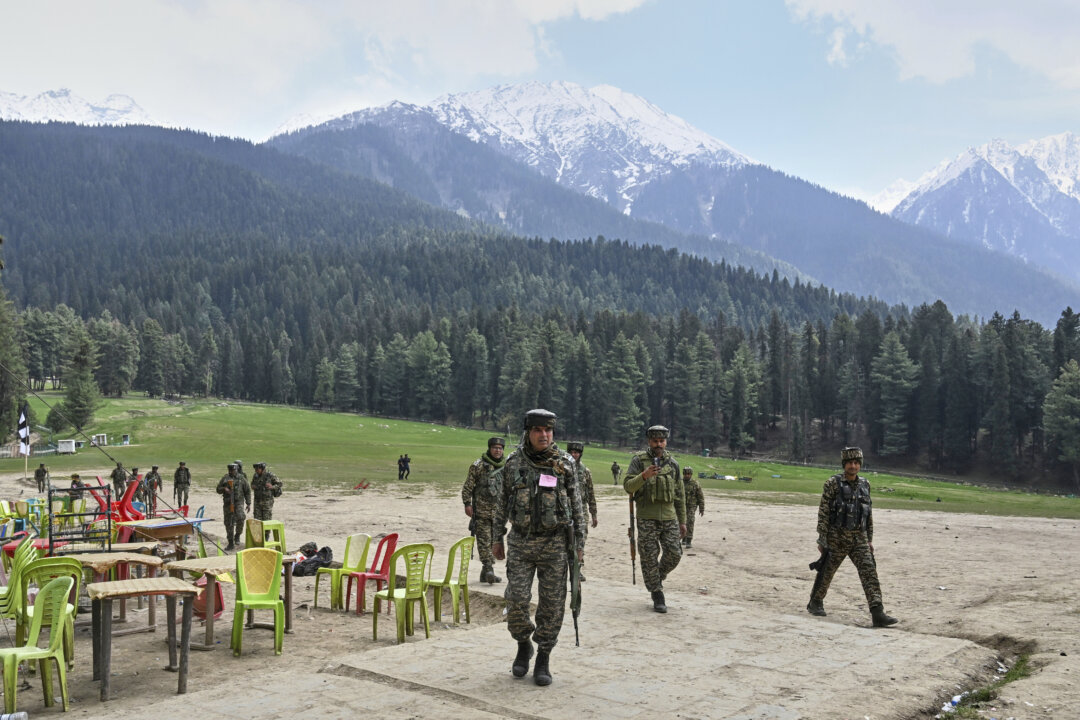Indian Prime Minister Narendra Modi, speaking in the eastern state of Bihar, said of the terrorists, ‘We will pursue them to the ends of the Earth.’
India has suspended the Indus Waters Treaty and closed the main border crossing with Pakistan, after blaming Islamabad for supporting terrorists who gunned down 26 tourists in Kashmir on Tuesday.
Gunmen also wounded dozens of people, including two senior police officers, during the attack in Baisaran meadow, three miles from the resort town of Pahalgam.
In a special briefing on Wednesday, Indian Foreign Secretary Vikram Misri said the cabinet committee on security had met and been told there were “cross-border linkages of the terrorist attack.”
Misri said several Pakistani diplomats were being asked to leave New Delhi, and some Indian diplomats were being recalled from Pakistan. India has also canceled the visas of Pakistani nationals.
A previously unknown terrorist group, Kashmir Resistance, has claimed responsibility for the attack, which killed 25 Indian nationals and one citizen of Nepal.
Messages left on a Telegram channel referred to the victims as “Hindu settlers.”
Indian Prime Minister Narendra Modi, who cut short a visit to Saudi Arabia, told a public meeting in the state of Bihar that the terrorists and their backers would be punished “beyond their imagination.”
“We will pursue them to the ends of the Earth,” he said.
The Hindu newspaper said India’s defense minister, Rajnath Singh, said they would go after those “sitting behind the scenes” who conspired to commit what he called the “nefarious acts” in Pahalgam.
Pakistan has denied any responsibility for the attack. The government in Islamabad has said it would convene its national security committee on Thursday and respond to India’s actions.
Pakistani Foreign Minister Ishaq Dar told the Dunya News TV channel, “India has taken irresponsible steps and leveled allegations.”
He described New Delhi’s reaction to the attack as “non-kinetic” and said India will see an equivalent response from Pakistan.
“If India crosses into kinetic action, God forbid, our armed forces are fully prepared,” Dar said. “We are a nuclear and missile-armed country. No one should think of threatening us. And if someone does, they will get a full response.”Pakistani Energy Minister Awais Leghari said India’s decision to suspend the Indus Waters Treaty was “an act of water warfare, a cowardly, illegal move.”
Relations between the two countries were already strained after Modi’s government revoked Kashmir’s semi-autonomous status in 2019 and split the Indian-administered region into two federally governed territories: Jammu and Kashmir, which borders Pakistan, and Ladakh, which borders China.
Kashmir has been disputed between India and Pakistan since 1947, when the British Empire withdrew from the subcontinent, leaving the region’s future in doubt.
India controls the majority of Kashmir, while Pakistan administers the northern and western areas. The Chinese communist regime controls territory in the east, some of which was ceded by Pakistan.
The Indus Water Treaty, brokered by the World Bank in 1960, allows for the sharing of a river system crucial to both countries.
Farmers in Pakistan rely on water from the Indus River—which flows through the country and empties into the Arabian Sea south of Karachi—and its tributaries to irrigate their land.
The treaty has remained in place despite India and Pakistan fighting two wars, in 1965 and 1971, and a border skirmish in the Kargil region of Ladakh in 1999.
Pakistani Defense Minister Khawaja Mohammad said India was using “an unfortunate incident of terrorism” as an excuse to drop a treaty it had been trying to evade for years.
Modi will hold a meeting on Thursday to brief India’s opposition parties on his government’s response to the attack.
Jammu and Kashmir Police published notices in an April 24 social media post naming three people they allege were involved in the Pahalgam attack.
They offered a reward of 2 million rupees ($23,450) for each of the gunmen. The notices said two of the three are Pakistani nationals.

Some terrorist groups have previously targeted the Indian military and security forces. The April 22 incident appears to be the first attack on tourists.
The meadow where the massacre occurred is surrounded by pine forests and snow-capped mountains. It is a popular destination visited by hundreds of tourists each day.
In 2021, India and Pakistan renewed a cease-fire agreement along their border, which has largely held since, despite occasional attacks on Indian forces by militants in Kashmir.
The Associated Press and Reuters contributed to this report.

